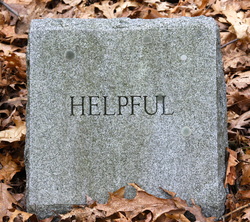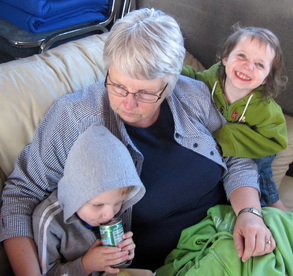 Nobody wants this Nobody wants this I have worked with great people who burned out because their tendency toward helping others has led them to work too hard, unappreciated, with diminishing returns. These people carry a huge burden. Even when they understand intellectually that they are exceeding their role, and that the people they are trying to assist need to step up, they still can’t bear to let them struggle, because that would feel unhelpful. Their family upbringing, culture, religion, or personality may demand that they act as supportive to others as possible, and suffer guilt if they fail to accomplish this. Fortunately, a mild tweaking of perspective may allow people with accommodating tendencies to overcome this burden and find peace.  She's actually a bus driver, but can't stand delays She's actually a bus driver, but can't stand delays Helpful, or dis-empowering and unhealthy? I once had a colleague who worked ridiculously long hours because he believed he was the only one that could properly handle certain situations. Whenever an incident occurred—which was often—he would either stay late or return to work to directly manage the crisis. He was highly competent, but got in trouble for excessive overtime, and his energy level steadily depleted. Furthermore, his constant involvement denied junior staff the opportunity to tackle challenging situations on their own. They just sat back, waited for Rick to step in, and never developed any hands-on experience. These eager, capable associates remained frustrated and dis-empowered, until Rick eventually collapsed. His quest to be helpful created so much physical stress that he landed on bed rest for two months, proving his approach was less than helpful. Think those languishing associates fell apart in his absence? Of course not—they stepped up and did their job. Maybe they didn’t handle every crisis as expertly as Rick, but they worked as a team, kept things running, and maintained their health. Without their supervisor’s “help,” the staff turnover rate actually declined. Rick learned the hard way that to be truly helpful over time, he needed to give more direct responsibility to his associates, allow them to struggle while building experience, and manage his own health to ensure he would be around to train future staff.  Having learned to cook at age 6, she is far from enabled Having learned to cook at age 6, she is far from enabled Helpful, or enabling? Dave has a serious alcohol problem. His dependence is so severe, he has landed in the ER with alcohol poisoning three times in two months. His parents plead with him to check into rehab, but he refuses, because certain people are “helping” him—a cousin, who gives him a warm bed, and a chef, who keeps re-hiring him as a waiter despite Dave’s repeated absences and intoxication on the job. These accommodations are actually the opposite of help, enabling Dave to avoid treatment because he feels comfortable enough with a roof over his head and makes sufficient funds to keep buying liquor. If these people really wanted to support Dave, they would refuse to house or employ him, leaving him no real option but rehab. Shutting a person out in the cold may not feel like help, but in cases like Dave’s, it’s the most compassionate act possible, and can even save a person’s life.  This 46-year-old CEO is over-matched and aging fast This 46-year-old CEO is over-matched and aging fast Helpful, or unproductive? Rebecca is a high-level academic advisor, who also happens to be super tech-savvy, unlike the rest of the staff in her organization. Her colleagues frequently ask her for computer tips, and sometimes seek her assistance with sophisticated application issues. Always wanting to feel helpful, Rebecca obliges these requests, which significantly drain her time. As co-workers interrupt her workflow with their own technical needs, she becomes progressively burdened, disorganized, and unproductive in her duties. The others suffer, too, because depending on Rebecca deprives them the opportunity to get the best tech support (like from an IT professional), or to seek training that would make them more capable users. Clearly, Rebecca would provide a superior form of help if she declined tech requests, and instead steered her colleagues toward these other options. True help is good for all
If you’re a hopelessly helpful person like me, or work with one, keep in mind that it’s not necessary or realistic to shut down the drive to assist and support. If you can agree that helping doesn’t have to mean being hands-on, accommodating, or instantly responsive, then you’re liberated. Realizing that assistance can come in different forms—allowing others to struggle and learn, declining requests to make room for superior systems of help, even denying basic needs—the altruist can set reasonable boundaries, fend off guilt and burnout, protect health, feel some peace, and promote better outcomes for everyone.
1 Comment
|
The Solutions Mine BlogAll articles written by Jason Sackett, PCC, LCSW, CEAP. Archives
July 2021
Categories |
Services |
Call310.251.2885
|
